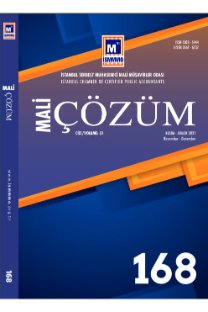Stoklarda değerlanme: UFRS/TFRS ve vergi mevzuatı açısından
Yeni Türk Ticaret Kanunu’nun yürürlüğe girmesiyle birlikte tüm işletmeler için Uluslar arası/Türkiye Finansal Raporlama Standartları (UFRS/ TFRS) zorunlu hale gelecektir. UFRS/TFRS kapsamında varlıkların, borçların, gelirlerin ve giderlerin muhasebeleştirilmesi ve finansal tablolarda raporlanması vergi mevzuatına göre farklılık göstermektedir. Stok maliyetinin hesaplanması ve stokların dönemsonunda değerlemesine ilişkin işlemler de iki sistem arasındaki önemli farklılıklardan biridir. Bu çalışma örnek uygulamalarla birlikte UFRS/TFRS’de stokların elde edilmesi ve dönemsonunda değerlemesine ilişkin işlemleri ve muhasebe kayıtlarını açıklamaktadır.
Valuation of inventory: From the persfective of IFRS/TFRS and tax legislation
With the enactment of the new Turkish Commercial Code, International/ TurkishFinancial Reporting Standards (IFRS/TFRS) will become mandatory for all firms. Under IFRS/TFRS, accounting for assets, liabilities, revenues and expenses and reporting of these items in financial statements differ from rules of tax legislation. Calculation of the cost of inventory and transactions regarding the valuation of inventory in the period end is one of the important differences between IFRS/TFRS and tax legislation. This study examines acquisition and valuation of inventories and explains accounting records of these transactions with examples.
___
- Akdoğan, Nalan ve Sevilengül, Orhan. (2007). Türkiye Muhasebe Standartları ile Uyumlu Tekdüzen Muhasebe Sistemi Uygulaması. 13. bs. İstanbul : İSMMMO
- Christie, Nancy L., Brozovsky, John ve Hicks, Sam. (2010) “International Financial Reporting Standards for Small and Medium-Sized Entities: An Update for the Commercial Loan Officer”. Commercial Lending Review (September-October 2010) : 28-34.
- Davis, Albion R. “Inventory Valuation and Business Profits: The Case for a Stabilized Basis”. National Association of Cost Accountants, NACA Bulletin. 19; 7 (1986) : 377-400.
- Epstein, Barry Jay ve Jermakowicz, Eva K. (2007). Interpretation and Application of International Financial Reporting Standards. [y.y.] : Wiley Editions.
- Graham, E. W. “Current Practices in Inventory Valuation”. National Association of Cost Accountants, NACA Bulletin. 18; 3. (1986) : 752- 768.
- Jermakowicz, Eva K. ve Epstein, Barry Jay. (2011). “Accounting Policy Options in IFRS”. The CPA Journal 81; 8 (2011) : 44-49.
- Kam, Vernon. (1990). Accounting Theory. 2.bs. Singapore : John Wiley & Sons Ediions
- Kerr, Stephen G., Gillett, John, Sandoz, Nathan ve Wilcox, William E. (2009), “International Financial Reporting Standards: Impact on Professional Financial Statement Users”. Commercial Lending Review (September- October 2009) : 3-8.
- Shanklin, Stephen B., Hunter, Debra R. ve Ehlen, Craig R. (2011), “A Retrospective View Of The IFRS’ Conceptual Path And Treatment Of Fair Value Measurements In Financial Reporting”. Journal of Business & Economics Research. 9; 3 (2011) : 23-28.
- Stanko, Brian B. ve Zeller, Thomas L. (2010). “The Arrival of a new GAAP: International Financial Reporting Standards”. Journal of Business & Economics Research. 8 ; 10 (2010) : 27-37.
- T.C. Yasalar (04.01.1961). 213 sayılı Vergi Usul Kanunu. Ankara: Resmi Gazete (10703-10705 sayılı)
- Tribunella, Heidi. “Twenty Questions on International Financial Reporting Standards”. The CPA Journal. 79; 3 (2009) : 32-37.
- Türkiye Muhasebe Standardı 2: Stoklar. Ankara : Türkiye Muhasebe Standartları Kurulu.
- Warren, Carl S., Reeve, James M. ve Duchac, Jonathan. (2009). Financial and Managerial Accounting. Cengage Learning. [y.y.] : [yayl.y.]
- Williams, Jan R., Haka, Susan F., Bettner, Mark S. ve Carcello, Josph V. (2008) Financial & Managerial Accounting. 14.bs. [y.y.] : McGraw-Hill
- ISSN: 1303-5444
- Yayın Aralığı: Yılda 6 Sayı
- Başlangıç: 1991
- Yayıncı: İstanbul Serbest Muhasebeci Mali Müşavirler Odası
Sayıdaki Diğer Makaleler
Stoklarda değerlanme: UFRS/TFRS ve vergi mevzuatı açısından
Gayrimenkul satış kazanç istisnası yanında yenileme fonundan yararlanabilme olasılığının incelenmesi
İskontoların muhasabesi ve denetimi
Vergi hukukunda ekonomik yaklaşım ilkesine genel bakış
2011 yılı gelir vergisi beyanlarında dikkat edilecek hususlar
